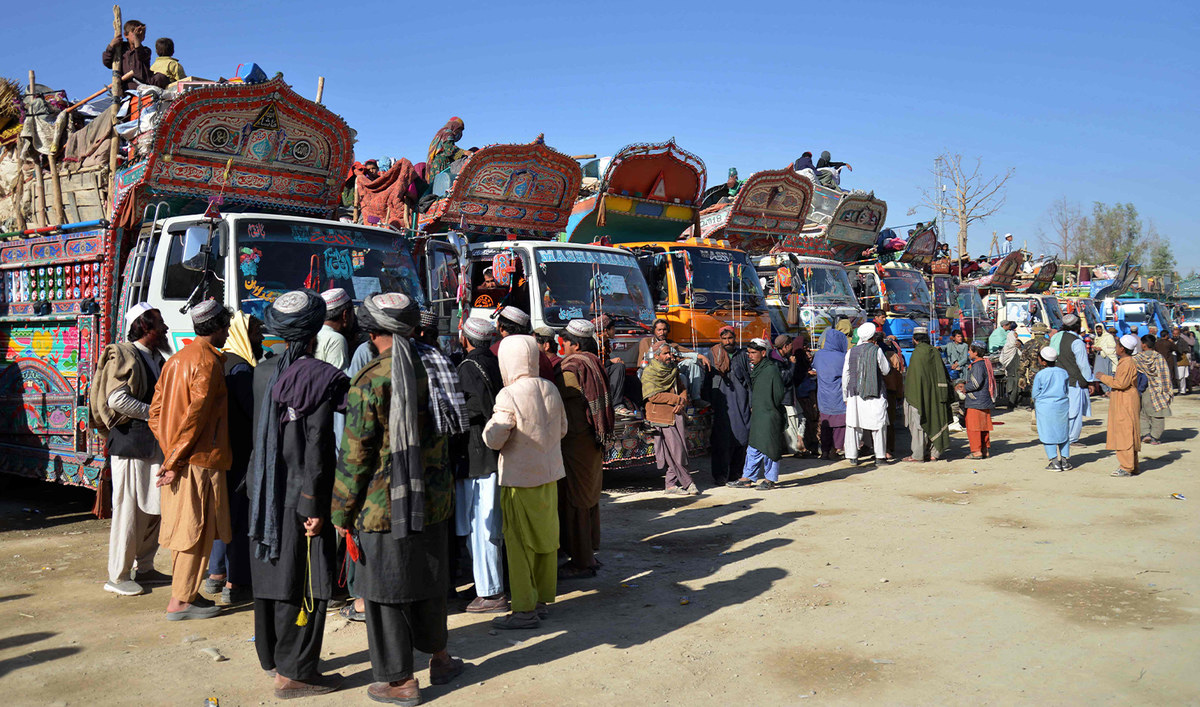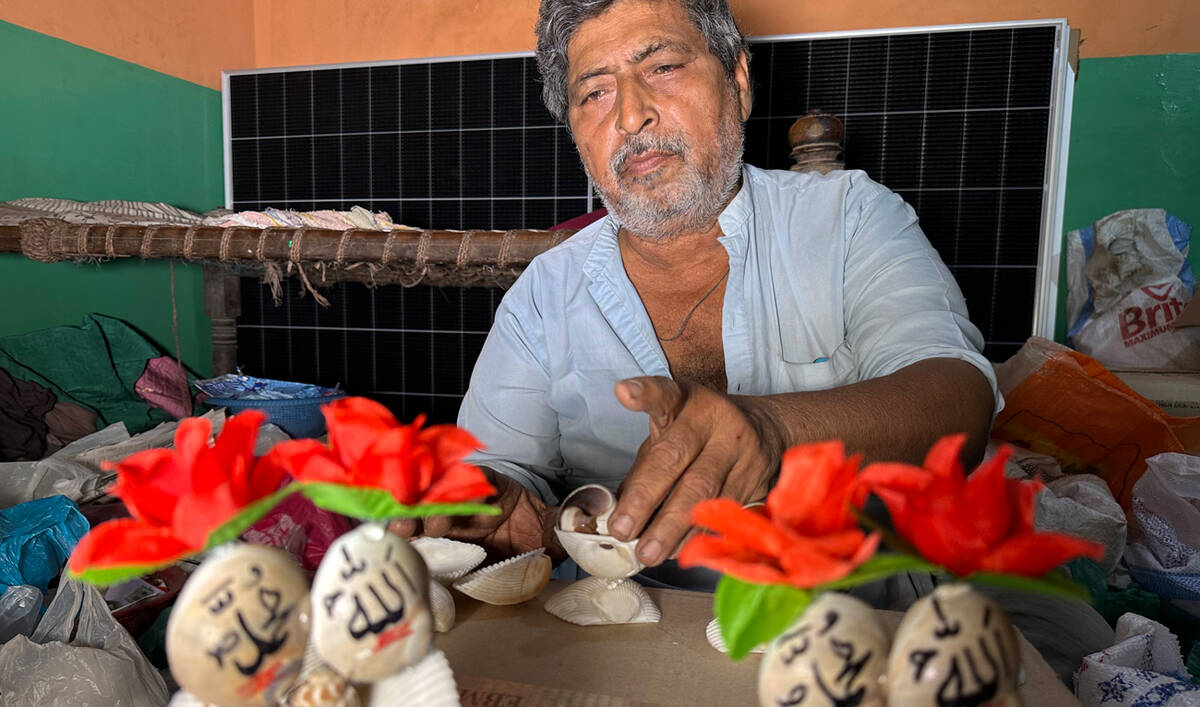KARACHI: Abdul, an Afghan migrant in Karachi, hasn’t been able to sleep properly for weeks. At nearly 50, he faces deportation to the country he fled as a child, and losing the life he has built in Pakistan.
“I don’t know if I have the strength to start all over again,” said Abdul, who runs a business buying scrap materials collected mainly by Afghan waste pickers, thousands of whom are set to be expelled from Pakistan due to a crackdown on undocumented migrants.
Many hurried to leave before a Nov. 1 deadline, or are lying low to avoid being rounded up by police, bringing Abdul’s business to a virtual standstill.
“For the last two months, there is no business,” Abdul told the Thomson Reuters Foundation, asking not to use his full name, as he ran a string of prayer beads anxiously through his fingers. From earning 30,000 Pakistani rupees ($104) a day, it is now down to 5,000 rupees.
As he considers leaving for Kunduz, the city in northern Afghanistan where he was born, he said it will be like going to live in a foreign country.
More than 280,000 Afghan nationals have left since Pakistan ordered all illegal immigrants, including more than 1.5 million Afghan nationals, to leave the country by the start of the month or be deported, according to the UN refugee agency, UNHCR.
The expulsion drive has driven relations between the neighbors to a new low, with Islamabad reiterating its claim that Islamist militants use Afghan soil to plan and carry out attacks in Pakistan.
Kabul says Pakistan’s security is a domestic problem.

Afghan refugees along with their belongings arrive on trucks from Pakistan, near the Afghanistan-Pakistan border in the Spin Boldak district of Kandahar province on November 20, 2023. (AFP/File)
LIVING FROM WASTE
Karachi, the largest city in Pakistan with a population of more than 20 million, is home to hundreds of thousands of Afghans, many of whom make a living as waste pickers — one of the few options available to undocumented migrants.
“They’ve been trapped in this work because of the government’s apathetic policy toward Afghan refugees,” said Shiza Aslam, research head at the Circular Plastic Institute at the Karachi School of Business and Leadership.
There are at least 43,000 of the informal garbage collectors working in Karachi, most of them Afghans, Aslam said, warning of a “public health disaster” if they leave.
Their departure will also set back efforts to recycle more of the city’s waste, said Shoaib Munshi, a member of the Pakistan Plastic Manufacturers Association.
“Garbage transfer stations will be overloaded and the garbage will flow onto roads and nalas (drains) and more burning will take place,” Munshi said
“It will cause a huge setback to the circular economy,” he added, urging the city government to act quickly to fill the gap left by the migrant workers.
An official at the provincial solid waste management board said plans were in place to plug the labor gap.
“We had a plan in place long before the deportation of Afghans was announced,” the official said, speaking on condition of anonymity. “The recyclers can now buy from us directly.”
‘GHOST TOWN’
With the Taliban in power, some Afghan migrants fear deportation to their native land, particularly those from persecuted groups such as members of the predominantly Shi’ite community Hazara community.
Others think they are simply better off in Pakistan, the only home many younger Afghans have ever known, and do not want to leave.
“Our relatives are telling us not to come but we have little choice,” said 20-year-old Moosa, who was born in Pakistan and has never been to Afghanistan. He also asked not to use his full name.
Until a month ago, he and his brother were able to earn about 120,000 rupees per month by sifting through the garbage and selling anything of value for recycling, such as cardboard, metal and plastic bottles.
The brothers both carry Afghan Citizen Cards, a government document that lets them reside legally in Pakistan and access public services, as well as allowing them to work in the informal economy.
But even Afghans living legally in Pakistan fear they could be forced to leave.
Recent comments by Balochistan caretaker minister Jan Achakzai, who said registered Afghans would also be deported under the government’s plan, have caused further alarm among migrants.
After both were detained by the police, his parents decided the family must pack up and head for their ancestral village in Kunduz, voluntarily, within days.
“What I’m truly going to miss most is this neighborhood and my friends,” Moosa said, gesturing toward the rundown area behind Karachi’s Al Asif Square, where many of the city’s Afghan population lives.
Many Afghan families have already left, he said.
“It’s a ghost town now,” he said, adding that he feared life would be harder in Afghanistan, especially during the cold winter months.
Gul, 60, a former waste-picker, voiced similar fears.
“Those who have gone tell us they are living in tents and in miserable conditions,” he said. “We have no home there.”
‘MONEY-MAKING RACKET’
The deportation plan has also led to increased harassment by police, at least 25 Afghan migrants and rights advocates told Context.
After his brief detention six weeks ago, Moosa said he was released after paying the police who detained him 20,000 rupees. A day later, his brother was picked up by the police and freed after paying 5,000 rupees.
“Harassing and hauling the poor Afghans is a huge money-making racket for the police,” said Moniza Kakar, a Karachi-based human rights lawyer.
Asked to comment, Syed Asad Raza, a senior police officer in Karachi, said the allegations of bribery were “completely baseless,” adding that while there may have been a few isolated cases, the issue has “been blown out of proportion.”
As Moosa and his family prepare to leave, he said he was angry that they had not been given enough time to dispose of the assets they have spent years accumulating.
They recently sold their house, a fast-food stall, six goats and a new fridge for a fraction of what they were worth, he said.
“Everyone is taking advantage of our plight,” he said.

























